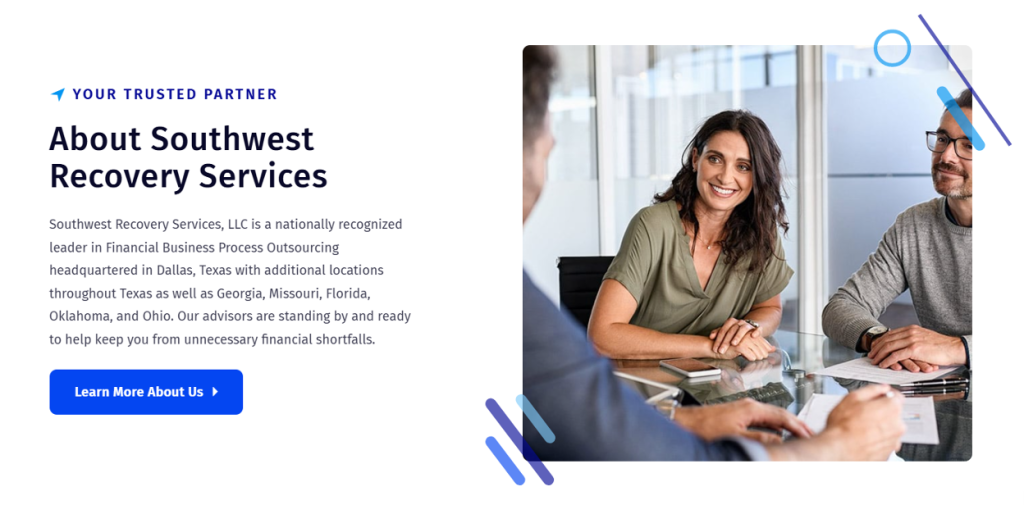- Customer Service 866-837-3065 Make A Payment (866) 558-3328
- Client Portal
- Consumer Support

When business customers fail to pay their invoices despite your internal collection efforts, professional debt recovery becomes necessary to protect your cash flow and maintain financial stability. Commercial debt collection is a process that differs significantly from consumer collections, requiring industry knowledge, relationship preservation skills, and compliance with complex regulations.
The commercial debt collection process involves systematic steps designed to locate debtors, establish communication, negotiate payment arrangements, and ultimately recover outstanding balances. Unlike aggressive consumer collection tactics, B2B recovery emphasizes professional communication that acknowledges the possibility of continued business relationships while firmly pursuing what’s owed.
Understanding this process helps business owners make informed decisions about when to escalate collection efforts internally versus when to engage professional agencies. For many companies, the transition happens around 60–90 days past due, when internal resources have been exhausted and accounts require specialized attention.
|
Southwest Recovery Services: Get Your Money Back 20+ Years Experience | Texas-Based | Contingency Only – You Pay When We Collect
Built for Commercial Collections:
The Southwest Recovery Difference: ✓ Contingency only – no upfront costs ✓ Veteran collectors with respectful omnichannel outreach ✓ Priority sectors: trucking, logistics, contractors, oil & gas ✓ Clear reporting on account status and outcomes Trust & Results You Need: Nationally recognized ethical collections agency with 12 offices across six states. Compliance-first approach with no threats or guarantees. |
The Commercial Debt Collection Process: Step-by-Step
Before placing accounts with a collection agency, businesses should implement internal pre-collection procedures. This stage involves sending reminder notices, making courtesy calls, and attempting to resolve payment issues directly with customers. Many payment delays stem from simple administrative oversights, disputed invoice terms, or temporary cash flow challenges that can be resolved without third-party intervention.
Effective pre-collection letters serve as diplomatic reminders that payment is overdue while maintaining professional tone and relationship respect. These communications should reference specific invoice numbers, clearly state outstanding balances, provide multiple payment methods, and invite dialogue about disputes or payment difficulties.
Documentation during this phase becomes critical for later collection efforts. Maintaining records of every communication attempt, payment promise, dispute raised, or excuse provided creates a detailed account history that professional collectors can use when escalating recovery efforts.

When internal efforts fail to produce results within 60–90 days, businesses typically engage professional collection agencies. Account placement begins with transferring detailed information, including debtor contact data, invoice copies, delivery confirmations, signed contracts, and communication history.
The agency also verifies compliance with applicable statutes of limitations and validates that all necessary legal requirements have been met. This protects both the creditor and agency from pursuing time-barred debts or accounts with insufficient documentation.
One of the most common obstacles in commercial collections involves outdated contact information. Businesses often relocate, change phone numbers or email addresses, or restructure operations, which can render original contact information outdated.
Professional agencies employ skip tracing techniques that locate current contact information through multiple databases, public records, credit headers, and proprietary information sources. This process identifies not only business addresses and phone numbers but also key decision-makers, authorized payment personnel, and alternative contacts within the debtor organization.

Once contact information is verified, collectors initiate communication through multiple channels. The omnichannel approach combines professional phone calls, formal demand letters, email correspondence, and text message reminders to maximize the probability of successful contact while accommodating debtor communication preferences.
Initial contact establishes the debt’s validity, confirms the debtor acknowledges the obligation, and finds reasons for non-payment. Professional collectors listen carefully to debtor explanations, distinguishing legitimate disputes from delay tactics, and identifying genuine financial hardships versus simple unwillingness to pay.
During this negotiation phase, collectors present several payment options, including full settlements and structured payment plans. When appropriate, they may also offer partial settlements or alternative arrangements that accommodate the debtor’s circumstances while still recovering funds for creditors.
The goal is to find solutions that motivate immediate action rather than simply demanding payment without flexibility.
Converting initial contact into actual cash recovery requires structured payment arrangements and rigorous follow-up. When debtors commit to payment schedules, professional collectors document every detail such as payment amounts, due dates, payment methods, and authorization specifics.
Consistent follow-up maintains pressure on debtors without crossing into harassment. Professional collectors understand the balance between persistent communication that motivates payment and excessive contact that violates regulations or damages relationships. This disciplined tactic keeps accounts progressing toward resolution rather than stalling indefinitely.

If negotiation and payment arrangements fail to produce results, collection efforts escalate to more serious measures. This stage may involve credit reporting (for eligible accounts), demand letters indicating potential legal action, and evaluation of legal remedies available for specific debt types.
For accounts warranting legal action, agencies coordinate with attorneys to pursue judgments, liens, garnishments, or other enforcement mechanisms. However, litigation is a last resort rather than a first response, as legal proceedings involve costs, time delays, and relationship destruction that most businesses prefer to avoid.

Commercial debt recovery requires specialized skills that most businesses don’t maintain in-house. Professional collectors understand debtor psychology, use proven negotiation tactics, and implement technology systems that track accounts more efficiently than manual processes.
Agencies also provide separation between financial disputes and ongoing business operations. When your internal team pursues collections, customers may withhold payment specifically to pressure favorable terms on current orders or future contracts. Third-party collectors eliminate this, creating neutral ground where payment obligations are addressed independently from business considerations.
Additionally, professional agencies maintain compliance expertise that protects creditors from liability. Federal regulations like the Fair Debt Collection Practices Act (FDCPA), state collection laws, and industry-specific rules create complex legal requirements that agencies apply daily. This compliance infrastructure prevents violations that could result in penalties, lawsuits, or reputational damage.

At Southwest Recovery Services (SWRS), we’ve dedicated over two decades to mastering commercial B2B debt collection. Founded in 2004 and headquartered in Addison, Texas, we operate 12 strategically located offices across six states, including Texas, Oklahoma, Missouri, Ohio, Florida, and Georgia, providing nationwide coverage with personalized regional service.
You don’t pay anything up front with our contingency pricing. There are no fees before we recover your funds. We only get paid when we successfully collect your funds.
We specialize in serving businesses across diverse industries, including trucking and transportation, logistics management, oil and gas, property management, commercial contracting, utility services, and government and municipality accounts. This industry specialization means our collectors understand sector-specific payment cycles, business challenges, and effective communication approaches that generic agencies lack.
Our approach emphasizes respectful, professional communication that preserves business relationships while recovering debts. We understand that today’s delinquent accounts might become tomorrow’s valuable customers, and our diplomatic strategies protect those possibilities while firmly pursuing what you’re owed.
Contact Southwest Recovery Services Now
The timeline varies significantly based on debtor responsiveness, account complexity, and payment capacity. Some accounts resolve within weeks through immediate payment or short-term payment plans, while others require months of persistent effort. Generally, newer debts resolve faster than aged accounts.
Most businesses transition accounts to professional collection around 60–90 days past due, after internal pre-collection efforts have been exhausted. However, this timeline depends on factors like debt size, customer relationship value, and internal resource availability.
If you’ve sent multiple payment reminders with no response, tried calling without success, or are dealing with disputed invoices that require negotiation expertise, professional assistance becomes valuable sooner rather than later.
Business relationships won’t be damaged as long as you choose a company that focuses on business-to-business collections and cares about keeping good connections. Southwest Recovery Services has experienced collectors who communicate politely and keep financial issues separate from your ongoing business.
Comprehensive documentation improves collection success significantly. Essential information includes debtor business name and contact details, invoice copies with dates and amounts, signed contracts or purchase orders, delivery confirmations or proof of service, any communication history regarding the debt, and details about disputes or partial payments received.
The more complete your documentation, the stronger the collector’s position when negotiating with debtors and the faster accounts typically resolve.
Southwest Recovery Services operates entirely on a contingency basis, charging no upfront fees whatsoever. When we successfully recover funds on your behalf, we retain an agreed-upon percentage as our fee, with the remainder remitted directly to you.
The specific rate depends on factors like debt age, account complexity, and placement volume. This performance-based model means you assume zero financial risk because you only pay when we deliver results.
*Note: Recovery rates mentioned are for general reference only and not guaranteed. Actual results vary by account and industry. Contact Southwest Recovery Services for a customized quote.


We make it fast and easy to refer past due and delinquent accounts to our professional recovery agents. You decide the range on what you will accept on each case, and you ONLY pay a percentage of what we actually collect to resolve the case. Ready to get started, or want to learn more? Fill out this form and a dedicate account manager will call you to get started.